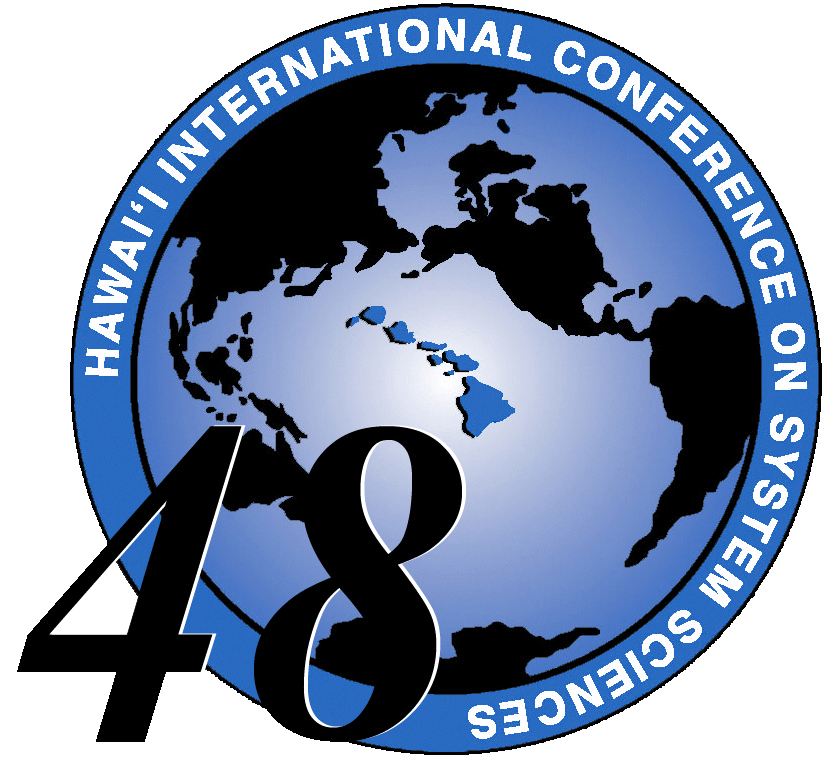HICSS - 48 E-Government Track
48th Hawaii International Conference on System Sciences
January 5-8, 2015 - Grand Hyatt, Koloa/Kauai, HI, USA
Overview
Minitracks
Symposia and Workshops
Other Links
Cyberspace Resiliency and Trust in 21st Century Government


IT systems are frequently relied upon for critical system operations on a 24x7x365 basis. The issue of resilience in the systems operational capabilities in the current environment of attackers, outages and system component failures has become an important issue at all levels of an organization. From the system operator, through the corporate owner, to industry and ultimately governmental responsibilities, resiliency has become a sought after and important characteristic of many systems. The science of resiliency is not as simple as buying additional components, and research into the design and operation of systems demonstrating resiliency and graceful degradation under conditions of attack is an important forefront of knowledge in the security arena. Resiliency addresses weaknesses in dissemination and interpretation of data before (preparedness and protection), during (response), and after (response and recovery) including the lack of interoperability and coordination among State, local, and regional homeland security professionals. This minitrack is to highlight new, cutting edge ideas and innovations that can lead to more resilient systems, a better understanding of what leads to resiliency and relevant policies to promote resiliency.
Minitrack topics include, but are not limited to:
- Systems for governments to respond to security events
- Community level resiliency preparation
- Critical Infrastructure Protection (CIP)
- Cyber Physical Systems resiliency
- Supervisory Control and Data Acquisition (SCADA) and control systems
- Cyber incident response and recovery
- Government information system resiliency at federal, state, and local levels including business continuity
- Case reports related to resiliency experiences within government
More information on the mini-track chairs:
Wm. Arthur Conklin, PhD, is an Associate Professor and Director of the Center for Information Security Research and Education in the College of Technology at the University of Houston. He holds two terminal degrees, a Ph.D. in Business Administration (specializing in Information Security), from The University of Texas at San Antonio (UTSA) and the degree Electrical Engineer (specializing in Space Systems Engineering) from the Naval Postgraduate School in Monterey, CA. He holds a variety of security certifications including Security+, CISSP, CSSLP, CSDP, CRISC, DFCP, IAM and IEM. His research interests include the use of systems theory to explore information security, specifically in Cyber Physical Systems. He has co-authored six security books and numerous academic articles associated with information security. Currently he is working on Smart Grid grants from DOE in the area of workforce development and training. He has an extensive background in secure coding and is a co-chair of the DHS/DoD Software Assurance Forum working group for workforce education, training and development. He is active in the DHS sponsored Industrial Control Systems Joint Working Group (ICSJWG) efforts associated with workforce development and cybersecurity aspects of industrial control systems. A senior member of several professional societies including ISSA, IEEE, ISACA and is a Fellow of National Board of Information Security Examiners.
Jim D. Ramsay, PhD, is currently professor of homeland security and chair of the newly formed department of Security Studies and International Affairs at Embry-Riddle Aeronautical University. He is also a certified safety professional. Dr. Ramsay teaches environmental security, strategic planning and decision making, emergency management, exercise design and evaluation, terrorism: origins and ideologies, and directs the internship program and the senior capstone consulting project. Dr. Ramsay was recently appointed by the US Secretary of Health and Human Services to serve on the Board of Scientific Counselors to the Director of the National Institute of Occupational Safety and Health in the CDC. Dr. Ramsay also serves on the Board of Directors for ABET, Inc. In addition, Dr. Ramsay serves on the Education Standards Committees for both the International Association for Intelligence Education (IAFIE) and the American Society of Safety Engineers (ASSE), where he also chairs the committee. Dr. Ramsay has also been a frequent scientific reviewer for the National Occupational Research Agenda, and currently serves on the editorial review boards for Homeland Security Affairs, the Journal of Homeland Security and Emergency Management, and the Journal of Homeland Security Education. He also is co-founder and current president of the International Society for Preparedness, Resilience and Security.
Co-Chairs
Wm. Arthur Conklin, PhD
(Primary Contact)
Department of Information and Logistics Technology
Center for Information Security Research and Education
College of Technology
University of Houston
312 Technology Building
Houston, TX 77204, USA
Phone: +1-713-743-1556
Fax: +1-713-743-5699
Email: waconklin@uh.edu
Jim Ramsay, PhD, MA, CSP
Chair, Department of Security Studies and International Affairs Professor of Homeland Security
College of Arts and Sciences
Embry-Riddle Aeronautical University
University 600 S. Clyde Morris Blvd
Daytona Beach FL 32114, USA
Phone: +1-386-226-7153
Email: james.ramsay@erau.edu
